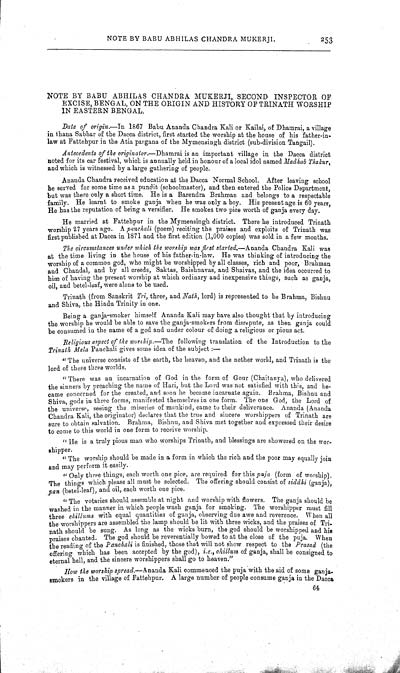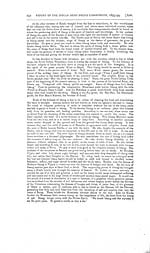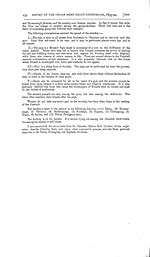Medicine - Drugs > Report of the Indian Hemp Drugs Commission, 1894-1895 > Volume III
(257) Volume 3, Page 253
Thumbnail gallery: Grid view | List view

NOTE BY BABU ABHILAS CHANDRA MUKERJI. 253
NOTE BY BABU ABHILAS
CHANDRA MUKERJI, SECOND INSPECTOR OF
EXCISE, BENGAL, ON THE ORIGIN AND HISTORY OF TRINATH WORSHIP
IN EASTERN BENGAL.
Date of origin.—In
1867 Babu Ananda Chandra Kali or Kailai, of Dhamrai, a
village
in thana Sabhar of the Dacca district, first started the worship at
the house of his father-in-
law at Fattehpur in the Atia pargana of the Mymensingh district
(sub-division Tangail).
Antecedents of the
originator.—Dhamrai is an important village in the Dacca
district
noted for its car festival, which is annually held in honour of a
local idol named Madhab Thakur,
and which is
witnessed by a large gathering of people.
Ananda Chandra received
education at the Dacca Normal School. After leaving school
he served for some time as a pundit (schoolmaster), and then
entered the Police Department,
but was there only a short time. He is a Barendra Brahman and
belongs to a respectable
family. He learnt to smoke ganja when he was only a boy. His
present age is 60 years,
He has the reputation of being a versifier. He smokes two pice
worth of ganja every day.
He married at Fattehpur
in the Mymensingh district. There he introduced Trinath
worship 27 years ago. A panchali (poem) reciting the praises
and exploits of Trinath was
first published at Dacca in 1871 and the first edition (1,000
copies) was sold in a few months.
The circumstances
under which the worship was first started.—Ananda Chandra Kali
was
at the time living in the house of his father-in-law. He was
thinking of introducing the
worship of a common god, who might be worshipped by all classes,
rich and poor, Brahman
and Chandal, and by all creeds, Saktas, Baishnavas, and Shaivas,
and the idea occurred to
him of having the present worship at which ordinary and inexpensive
things, such as ganja,
oil, and betel-leaf, were alone to be used.
Trinath (from Sanskrit
Tri, three, and Nath, lord) is represented to be
Brahma, Bishnu
and Shiva, the Hindu Trinity in one.
Being a ganja-smoker
himself Ananda Kali may have also thought that by introducing
the worship he would be able to save the ganja-smokers from
disrepute, as then ganja could
be consumed in the name of a god and under colour of doing a
religious or pious act.
Religious aspect of
the worship.—The following translation of the Introduction to
the
Trinath Mela Panchali gives some idea of the
subject:—
"The universe consists of
the earth, the heaven, and the nether world, and Trinath is
the
lord of these three worlds.
"There was an incarnation
of God in the form of Gour (Chaitanya), who delivered
the sinners by preaching the name of Hari, but the Lord was not
satisfied with this, and be-
came concerned for the created, and soon he became incarnate again.
Brahma, Bishnu and
Shiva, gods in three forms, manifested themselves in one form. The
one God, the Lord of
the universe, seeing the miseries of mankind, came to their
deliverance. Ananda (Ananda
Chandra Kali, the originator) declares that the true and sincere
worshippers of Trinath are
sure to obtain salvation. Brahma, Bishnu, and Shiva met together
and expressed their desire
to come to this world in one form to receive worship.
"He is a truly pious man
who worships Trinath, and blessings are showered on the wor-
shipper.
"The worship should be
made in a form in which the rich and the poor may equally
join
and may perform it easily.
"Only three things, each
worth one pice, are required for this puja (form of
worship).
The things which please all must be selected. The offering should
consist of siddhi (ganja),
pan (betel-leaf), and oil, each worth one pice.
"The votaries should
assemble at night and worship with flowers. The ganja should
be
washed in the manner in which people wash ganja for smoking. The
worshipper must fill
three chillums with equal quantities of ganja, observing due
awe and reverence. When all
the worshippers are assembled the lamp should be lit with three
wicks, and the praises of Tri-
nath should be sung. As long as the wicks burn, the god should be
worshipped and his
praises chanted. The god should be reverentially bowed to at the
close of the puja. When
the reading of the Panchali is finished, those that will not
show respect to the Prasad (the
offering which has been accepted by the god), i.e., chillum
of ganja, shall be consigned to
eternal hell, and the sincere worshippers shall go to
heaven."
How the worship
spread.—Ananda Kali commenced the puja with the aid of some
ganja-
smokers in the village of Fattehpur. A large number of people
consume ganja in the Dacca
64
Set display mode to: Large image | Zoom image | Transcription
Images and transcriptions on this page, including medium image downloads, may be used under the Creative Commons Attribution 4.0 International Licence unless otherwise stated. ![]()
| India Papers > Medicine - Drugs > Report of the Indian Hemp Drugs Commission, 1894-1895 > Volume III > (257) Volume 3, Page 253 |
|---|
| Description | Volume 3: Appendices. Miscellaneous. |
|---|---|
| Attribution and copyright: |
|




